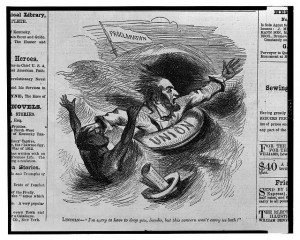OBSERVER, a correspondent for The New-York Times thinks the Lincoln administration’s plans to colonize freed slaves would work better if the colony was in the rebel states – preferably Florida.
From The New-York Times December 8, 1861:
VIEWS FROM THE CAPITAL.; The Proposition to Colonize the Freed Slaves Florida a Proper Location for the Colony …
WASHINGTON, Thursday, Dec. 5, 1861.
The recommendation of the President to purchase a foreign territory on which to colonize the free people of color, and the slaves which are being emancipated by the rebellion of their masters evinces the conservative spirit which has ever actuated him, and gives the lie to the base falsehoods by which the traitors deluded the Southern people into an attitude of open hostility to the Government.
But in the actual condition of things, it may be doubted if the country is called upon, by a sense of justice to the rebels to incur the expense of a purchase of territory, and a transportation of the blacks beyond the limits of the Union. And the question arises, have we not within the Union, and far remote from the present loyal population of the South, the greatest abundance of territory suitable, and eminently suitable, for the abode of the negro race? What are the lowlands of South Carolina, Georgia, Alabama, Mississippi and Texas, together with the whole of Florida and Louisiana, fit for but the home of a negro population? I know that white men may live and labor in these warm and unhealthy districts; but nothing is more certain than that negroes are better adapted to them, and, indeed, eminently suited to them. These lowlands are nor the best portion of the cotton region, and I think it would be found on examination of the statistics of that culture, that much of the largest portion of the cotton crop is grown in the uplands, where white labor is practicable. I will venture to assert that the slaveholders of Texas have taken possession of the very best cotton lands in that State, and that those they have left untouched are for some reason less desirable. If, therefore, it be so important to cultivate cotton with white labor, an idea which seems to be very prevalent, the negroes must be removed. This will not be done immediately, if they are to be sent to remote regions, far beyond the limits of the Union. The most feasible scheme to get the negroes away from the healthy cotton-fields, and from the still more healthy corn, wheat and tobacco fields of the Middle and Northern Slave States, is to invite them to the rice-fields, and the swamps and hummocks of the low country. There is an ample amount of territory in these lowlands belonging to the States, and not to individuals, to support the negro population of the entire South. These swamp lands are inexhaustible in fertility, and they only need to be drained and cleared to become as productive as the valley of the Nile. If the Government desires to invest some millions in colonization here is the proper field for its operations, and by applying its capital to this purpose it will confer the triple benefit upon the country of providing permanent homes for the negroes, separating them from the whites, and at the same time opening up a new source of productive wealth — nay, it will confer still another blessing upon the country, in the substitution of cultivated fields for morasses which now reek with pestilential miasmas.
I have heretofore called attention to the fact that the Government has no right to confiscate estates except during the lifetime of the traitor. But the plan of colonization here sketched has nothing to do with the confiscation of individual property, and only proposes to seize that of the rebel States, which it may lawfully do as a means of saddling upon them the cost of the war. If individuals choose to employ the “contrabands” who come into their vicinity, they would be at liberty to do so; and on the other hand, if the vicinity of the “contraband” colony should be found incompatible with the due subordination of their slaves, more’s the pity that they ever listened to the voice of the secession syren.
By all means let the proposed colonies be within the present limits of the Union. There will be no difficulty in taking immediate possession of the Florida peninsula, and there is the place to begin the experiment. Due care should be taken to encourage labor, punish vagabondism and punish lawlessness. The dry hummocks in Florida are very fertile, and comparatively healthy. They only require to be cleared of the underbrush. …

